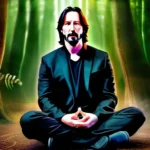Exploring the complex reasons behind the loss of faith and the search for spiritual fulfillment.
Have you ever wondered why some people choose to leave their religious beliefs behind? In this comprehensive article, we delve into the various factors that contribute to this decision, providing valuable insights into the human experience and the quest for meaning.
The Roots of Doubt: Early Experiences and Influences
Imagine growing up in a world where faith was as natural as breathing, like believing in something because it was there from your earliest memories—like how you knew the sun would rise every morning without questioning its existence. But then comes a moment, or perhaps several moments, that challenge this deep-seated belief. Could it be the first time you saw a star through a telescope and realized the vastness of space? Or maybe an encounter with someone who seemed to have found their spiritual fulfillment outside the confines of organized religion?
What about societal pressures, those subtle whispers in your ear that question why you stick to a belief system when the world seems to be moving on? How do these forces shape your journey towards doubt? These experiences, whether they are personal or collective, can serve as catalysts for questioning. It’s like walking down a familiar path only to find it littered with questions instead of answers.
Consider the upbringing in a religious household where beliefs were not just taught but lived every day. How did those early teachings influence your perception of religion? Was there ever an instance when you questioned one of these teachings, and if so, what happened next? Did seeking answers lead to more questions or did it strengthen your faith?
These formative experiences can be the roots from which doubt sprouts. They could be moments of disappointment, realization, or even joy that challenge the very foundation of your belief system. It’s like planting a seed in fertile soil; over time, it grows and changes the landscape around it. The journey towards questioning faith is often filled with these kindling experiences that eventually ignite a fire of doubt.
What are some specific instances from your life where you felt compelled to question your faith? How did these experiences shape your understanding of the world and your place in it?
The Role of Reason and Science in Faith Loss
Can reason and science truly dismantle religious beliefs? It’s a question that has puzzled many as they grapple with the challenges these disciplines pose to their faith. In this journey, we explore how rationality and scientific discoveries can be like a powerful river eroding away the very foundations of traditional belief systems.
Imagine a person raised in a deeply religious household where every moment is steeped in divine guidance and ritual. One day, they stumble upon the theory of evolution or read about quantum physics that challenges their understanding of the universe. Suddenly, these new ideas don’t just contradict their beliefs; they seem to undermine the very fabric of reality as they know it.
Is there a way to reconcile reason with faith? Or is the path ahead as stark and clear-cut as choosing between two diverging roads in a dense forest? Many find themselves at this crossroads, questioning not just what they believe, but why they believed it in the first place. They begin to see their old beliefs as more like myths woven into the fabric of societal tapestries rather than truths etched in stone.
But why does losing faith feel so painful? It’s as if one is peeling away layers of a self-built identity, exposing raw and vulnerable skin beneath. The loss of faith can be likened to the withering away of a plant that has been overwatered or neglected—too much knowledge, too little nurturing.
How do these individuals find new paths? Some seek solace in agnosticism, accepting the unknown rather than embracing certainty. Others embrace atheism, standing firmly against any form of divine existence. And some explore alternative spiritualities that blend Eastern philosophies with Western science, creating a hybrid belief system that feels more grounded and logical.
The journey from faith to reason can be bumpy, filled with moments of doubt and questions that seem impossible to answer. But for many, this path also leads to a deeper understanding of the human experience—how we perceive the world, and our place within it. It’s a transformation as profound as shifting from daydreaming under a tree to staring at the stars, wondering about the vastness beyond.
The Pursuit of Personal Spirituality: Alternative Paths
As people explore the complex reasons behind losing faith, they often find themselves embarking on diverse and sometimes unexpected paths. Have you ever wondered why some individuals choose to leave their religious beliefs behind? The pursuit of personal spirituality is a multifaceted journey that can lead down various roads, each as unique as the individual making this choice.
One path many travelers follow is agnosticism. It’s like standing on a precipice, where you look over both sides but find it challenging to commit fully to either side of the religious fence. Agnostics often question and seek answers without definitively settling for one belief system or another, navigating between faith and doubt with an open mind.
Then there are those who embrace atheism, a clear-cut path that rejects any belief in deities. It’s akin to declaring independence from traditional religious structures, forging their own paths through skepticism and rational thinking. Atheists often find strength in community and dialogue, seeking common ground among like-minded individuals who share similar views on the nature of existence.
Some individuals turn towards new-age spirituality, exploring practices that blend various beliefs, often centered around personal growth and holistic wellness. This path is more of a winding trail through diverse landscapes—Eastern philosophies, nature-based practices, or even channeling energies. It’s like wandering in a vast forest where every tree represents a different belief system, and the journey itself becomes an exploration of self-discovery.
Each of these paths—the agnostic, atheistic, and new-age routes—is a testament to human diversity and the complexity of religious beliefs. They challenge us to question, to seek, and to find meaning in ways that resonate with our personal experiences and values. As we navigate this landscape, we are not just exploring alternative paths but also defining what spirituality means to each one of us.
The Emotional Toll of Faith Loss: Coping Mechanisms
The Emotional Toll of Faith Loss: Coping Mechanisms
Imagine embarking on a journey, only to find yourself lost in the wilderness of your own soul. That’s what it feels like for many when they lose their faith. The emotional landscape can be fraught with challenges that seem insurmountable.
The first wave you might feel is guilt. It’s as if you’ve betrayed a lifelong companion, and the weight of letting go feels heavy. But why should leaving behind a belief system come with such guilt? Is it because we’re so tied to the familiar that change becomes almost unbearable?
Is guilt the only emotion you experience when your faith crumbles? Many find themselves isolated, feeling like they’ve been cast out of their spiritual home. This sense of isolation can be profoundly lonely, as if the very air around them has shifted, leaving behind a void that’s hard to fill.
Grief also plays a significant role in this emotional journey. It’s not just about the loss of belief; it’s the loss of identity and the communities that once supported you. Grieving can be as complex as dealing with the death of a loved one, but often without the societal rituals to mark your passage.
So how do we navigate these emotions? One powerful tool is counseling or therapy. Speaking to someone who understands the emotional complexity of faith loss can provide a safe space for processing feelings. It’s like having a compass in an unfamiliar landscape, helping you find your way back to a sense of self.
Another approach is journaling. Writing down your thoughts and emotions can be incredibly therapeutic. It’s like laying out the pieces of a puzzle on a table, allowing you to see them more clearly and piece together new understandings of yourself.
And what about embracing community? Finding others who share similar experiences can provide a sense of belonging. Online forums or local support groups can be lifelines, offering a sense of connection in a world that feels increasingly disorienting.
The journey through emotional challenges is not easy, but with the right tools and support, it’s possible to find new meaning and peace. Remember, every step forward, no matter how small, is a step towards healing and self-discovery.
The Impact on Community and Social Relationships
The impact of losing faith can ripple through one’s social fabric, affecting relationships and connections like ripples on a pond after a stone is thrown. How does one navigate these changes without feeling lost in their community? Can maintaining authentic connections be as simple as finding common ground or as complex as redefining what those connections mean?
Consider the journey of Sarah, who once felt deeply connected to her religious community. Now, as she moves away from traditional beliefs, she finds herself questioning how to stay engaged and valued. She wonders, ‘Can I still be part of this group without sharing their values?’ The answer lies in understanding that every relationship is a two-way street—both parties can contribute to its evolution.
Family dynamics become another layer of complexity. For many, faith has been a shared foundation, but now there are differing viewpoints. How does one maintain these bonds when the very core of their beliefs have shifted? ‘Do I still belong in this family if my views have changed?’ This question can be particularly challenging, as families often rely on shared traditions and values.
Friends, too, play a crucial role. Some may share your new path, while others might not understand or even disapprove. The key is open communication. By sharing your journey, you can find those who resonate with your experiences and create new connections. ‘How do I approach friends about my changing beliefs?’ This can be daunting, but it’s essential for maintaining meaningful relationships.
In essence, the challenge lies in finding balance—how to honor old ties while forging new ones. It’s a dance of adaptation, where authenticity and connection are the partners that guide you through this complex terrain. By embracing these changes with openness and honesty, one can maintain vibrant connections that enrich their life despite losing faith in traditional religious structures.
The Path Forward: Fostering Understanding and Acceptance
How do we navigate the complex terrain of faith loss and the subsequent search for spiritual fulfillment? The journey from believing to questioning can be as tumultuous as crossing a stormy sea, where every wave brings its own set of challenges. Are we destined to drift aimlessly in this vast ocean, or can we find safe harbor amidst the turbulence?
Understanding the journey involves acknowledging that faith is not just a fixed point but a dynamic process that evolves over time. Many people lose faith due to personal experiences, intellectual inquiries, or disillusionment with institutional practices. It’s like losing your way in a dense forest; you realize that what once seemed clear and unchallenged now feels obscure and confusing.
Fostering understanding and acceptance within our communities is crucial. Imagine walking into a room filled with strangers, each holding different beliefs—some traditional, others modern. How do we ensure everyone feels valued and heard? By promoting open-minded dialogue and greater tolerance. We must learn to respect the diverse paths that people take in their spiritual journeys.
Empathy plays a pivotal role here. If you’ve ever felt lost or alone, you understand how crucial it is for others to acknowledge your struggles. Encourage conversations where individuals can share their experiences without fear of judgment. This creates an environment where everyone feels safe to explore their beliefs openly and honestly.
Beyond mere acceptance, we must strive for genuine understanding. Ask questions, seek answers, and be willing to change perspectives. It’s like planting seeds in a garden; sometimes the growth is slow, but with care and patience, beautiful flowers will bloom. Through these conversations, we can build stronger, more inclusive communities where everyone feels supported.
Let us embrace this journey of faith loss not as a destination but as an opportunity for deeper self-discovery and connection. By fostering understanding and acceptance, we can navigate the complex landscape of spirituality together, ensuring that no one feels left behind in their search for meaning.
Conclusion
 By understanding the complexities of faith and the reasons behind its loss, we can foster empathy and promote open-minded dialogue about spirituality. This article serves as a stepping stone towards greater understanding and acceptance of diverse beliefs.
By understanding the complexities of faith and the reasons behind its loss, we can foster empathy and promote open-minded dialogue about spirituality. This article serves as a stepping stone towards greater understanding and acceptance of diverse beliefs.











